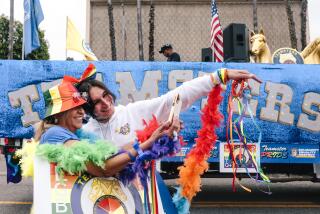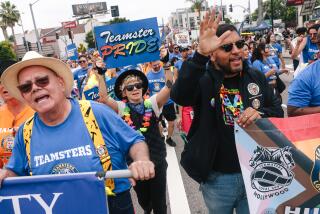Other Unions Support Players
Leroy Hamilton, 66, lives in a South Central Los Angeles apartment. He is a home-care worker responsible for an 82-year-old Los Angeles woman who requires daily meal preparation, diabetes tests, bathing and home clean-up.
Hamilton earns $6.75 an hour from a Los Angeles County public authority, the Personal Assistant Services Council. He belongs to the Service Employees International Union Local 434-B, which is negotiating for a 75-cent hourly raise when the county approves its expenditures Sept. 18.
“I feel very strong about this,” Hamilton said. “When you’re a member of a union, you want what’s best for your fellow worker. We are one. We are a whole.”
A lifelong baseball fan, Hamilton said there’s no better example of that solidarity than the Major League Baseball Players Assn., which got a minimum-salary raise, to $300,000, in its settlement with owners Friday.
“After watching where they’ve come from, what they’ve got and how they intend to keep it, I’m with the players all the way,” Hamilton said.
Despite the great disparity in the money involved, Oria Green, a political organizer for SCIU, agreed with Hamilton.
“Sports is sports,” she said. “We don’t need sports for our society to function. The things we’re doing for people as home-care workers are mandatory, things that allow people to live. But I’m cool with sports.
“It doesn’t matter what you’re fighting for in a labor movement, you have to fight for what’s right. And if there are people on the other side of things willing to dupe you, you have to stick together. Unions fight for you and make things right.”
Green has taken to extreme measures to gain publicity for her union’s fight. On Aug. 20, she said, she was one of 17 SCIU members arrested for failure to disperse near the Hall of Administration. A large contingent of home-care workers congregated downtown, some marching into the streets, stopping traffic and scuffling with police. The incident drew slight media attention.
Tyrone Freeman, president of Local 434-B, can only dream of winning the media coverage of baseball union leader Don Fehr, although Freeman said he would implement more “direct actions of civil disobedience” as the wage decision nears.
“There’s plenty more to come,” Freeman said. “That incident at Broadway and Figueroa was just a little swig in the hot summer heat, so to speak.”
Hamilton said he was arrested in a union incident last year, adding, “People don’t seem to understand how difficult it is to live on such a small amount of money.”
Ramon Ponce deLeon, president of the International Longshore and Warehouse Union Local No. 13 in Wilmington, said the number of similarities in union brotherhood easily outnumbered the financial differences baseball’s union has with organizations such as the longshoremen’s. Many ILWU workers, including Local No. 13, have been working on a day-to-day contract since their agreement with Pacific Maritime Assn. expired July 1. Negotiations have stalled on health care and dock technology issues.
“There may be an entirely different classification in earnings, but we’re both paid on our skills,” Ponce deLeon said. “It’s just that our skills provide more immediately for things like a home and family. None of us want a strike.”
A common philosophy links the unions, said Steve Holguin, an attorney whose firm represents the home-care workers and longshoremen.
“Workers are entitled to get what they can,” Holguin said. “If the owners generate good money, the players deserve some too. There are workers and there are people making money off of them. The worker who gets the most is the one who realizes the strength in numbers.”
More to Read
Go beyond the scoreboard
Get the latest on L.A.'s teams in the daily Sports Report newsletter.
You may occasionally receive promotional content from the Los Angeles Times.











